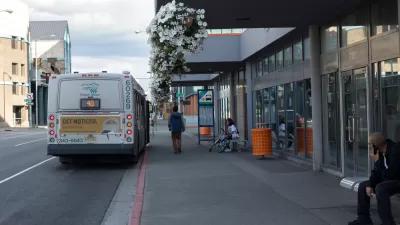Draft regulations under consideration in Anchorage "would prohibit building large cellphone towers next to homes in dense urban settings."
"The draft regulations encourage 'small-cell' technologies, or low-powered wireless base stations that can be mounted to light poles and typically help boost coverage in high-use areas like stadiums or malls."
"Other proposed changes include reducing the separation distance required between a cellphone tower and the nearest home. Current city law requires a separation distance equal to 200 percent of the height of the tower, but phone companies can get around that through loopholes. The new regulations are designed to close that loophole, officials said, through new guidelines for minimum separation distances. They would also set a maximum height of 65 feet for a tower in a residential district."
"Since they were released in mid-November, the draft regulations have gotten mixed reviews. Community activists said they’d like to see clearer definitions for certain types of towers and more ways for neighbors to weigh in on projects near their homes."
FULL STORY: Anchorage weighs new rules on cell towers in neighborhoods

Maui's Vacation Rental Debate Turns Ugly
Verbal attacks, misinformation campaigns and fistfights plague a high-stakes debate to convert thousands of vacation rentals into long-term housing.

Planetizen Federal Action Tracker
A weekly monitor of how Trump’s orders and actions are impacting planners and planning in America.

In Urban Planning, AI Prompting Could be the New Design Thinking
Creativity has long been key to great urban design. What if we see AI as our new creative partner?

Florida Seniors Face Rising Homelessness Risk
High housing costs are pushing more seniors, many of them on a fixed income, into homelessness.

Massachusetts Budget Helps Close MBTA Budget Gap
The budget signed by Gov. Maura Healey includes $470 million in MBTA funding for the next fiscal year.

Milwaukee Launches Vision Zero Plan
Seven years after the city signed its Complete Streets Policy, the city is doubling down on its efforts to eliminate traffic deaths.
Urban Design for Planners 1: Software Tools
This six-course series explores essential urban design concepts using open source software and equips planners with the tools they need to participate fully in the urban design process.
Planning for Universal Design
Learn the tools for implementing Universal Design in planning regulations.
Gallatin County Department of Planning & Community Development
Heyer Gruel & Associates PA
JM Goldson LLC
City of Camden Redevelopment Agency
City of Astoria
Transportation Research & Education Center (TREC) at Portland State University
Jefferson Parish Government
Camden Redevelopment Agency
City of Claremont





























